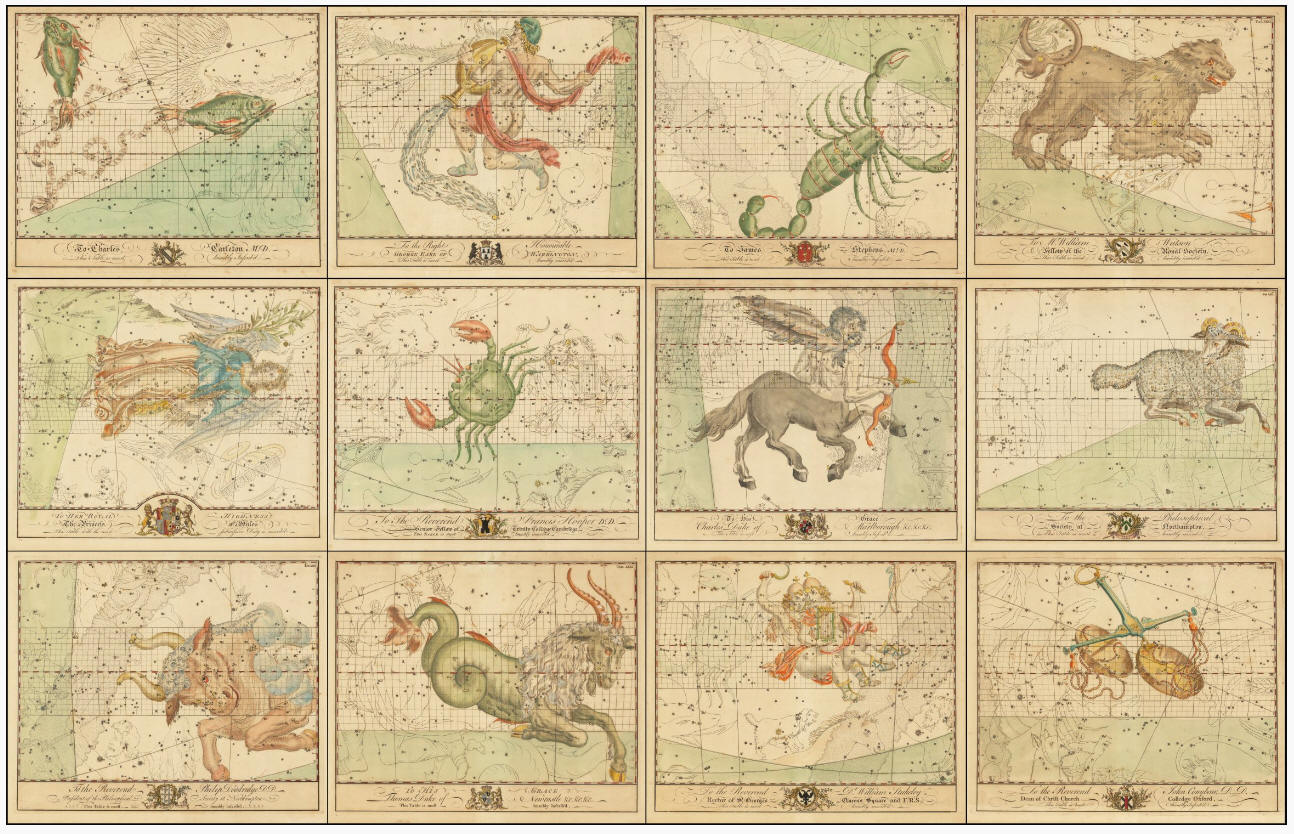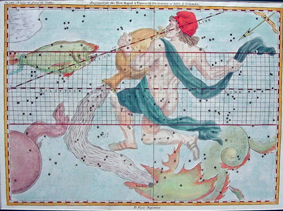|
John Bevis Atlas celeste
John Bevis (November 10, 1695 - November 6, 1771) A
cura di Hartmut
Frommert e Christine Kronberg Born
on November 10. In
1738 he set up a private observatory at Stock Newington, North London,
from where he made observations for his own star atlas, Uranographia
Britannica, which he completed in 1750. Unfortunately, the publisher went
bankrupt after engraving the 52 plates, and only very few printings had
been made (Bevis
1750). It was eventually published posthumously, in 1786, from the
plates engraved in 1748-50. This
atlas contains the "nebulae" M1, M11, M13, M22, M31,
and M35, which
Bevis must have known about; this indicates that he might be the
original discoverer of M35 also (this is usually assigned to De
Chéseaux). Charles
Messier had access to a copy of this work, and consequently,
added references to this work in the corresponding entries in his catalog. Bevis' Atlas
Celeste has lately been researched (Ashworth
1981, Kilburn et.al. 2003).
It also contains the star clusters M44 (Praesepe)
and M45 (Pleiades),
as well as southern Omega
Centauri (NGC 5139) and NGC
6231. Moreover, it contains three stars which don't exist as such
("extinct stars"): One of them is clearly open cluster M29 which
is shown as star and not as nebula or cluster, another one is Nova 1670
Vulpeculae, and the nature of a third one, in Ursa Minor at RA 16:10, Dec
+82d (J2000.0) cannot be cleared up. The atlas also shows the positions of
the supernovae of Tycho (1572) and Kepler (1604). Bevis
is one of only two persons in Britain who are known to have observed comet
Halley on its first predicted return in 1759: He observed it on May 1 and
2, 1759 after its perihelion; the other British observer, also physician,
was Nicholas Munckley who saw it on the same dates. From
somewhen in the 1760s until shortly before his death, Bevis was in
correspondence with Charles Messier, and translated some of Messier's
earlier observing reports and publications for
publication in the Philosophical Transactions. John
Bevis died on November 6, 1771 at age 76, from injuries received in a
tragic accident when falling from his telescope. Links:
John
Bevis' ATLAS CELESTE ( John
Bevis' Uranographia Britannica, featured by William B. Ashworth,
Jr of the Linda Hall Library within their Out of This World Online
Exhibition John
Bevis images and info, NGC/IC observers' page Some John Bevis info, Yann Pothier
References:
William
B. Ashworth,
1981. John Bevis and his Uranographia (ca. 1750). Proceedings of the
American Philosophical Society, Vol. cxxv (125), pp. 52-73. John
Bevis,
1750. Atlas Celeste (Uranographia Britannica). John Neale, London;
unpublished prints. Kenneth
Glyn Jones,
1968. The Search for the Nebulae -- III. Journal of the British
Astronomical Association, Vol. 78, No. 6 (1968), pp. 446-454. Section on
Bevis: pp. 450-451. Reprinted in: The Search for the Nebulae. Chalfont St.
Giles, 1975. Kenneth
Glyn Jones,
1991. Messier's Nebulae and Star Clusters. 2nd ed, Cambridge University
Press, pp. 313-314. Kevin
J. Kilburn, Jay M. Pasachoff, and Owen Gingerich,
2003. The Forgotten Star Atlas: John Bevis's Uranographia Britannica.
Journal for the History of Astronomy, Vol. 34, pp. 125-144. [ADS:
2003JHA....34..125K]. Hartmut
Frommert e Christine Kronberg http://messier.seds.org/xtra/Bios/bevis.html
Tavola dedicata alle costellazioni zodiacali:
http://www.atlascoelestis.com/Bevis%20set.htm
|
Tavole
Esempio di descrizione costellazione
Costellazioni boreali Ursa minor Ursa Major, Leo Minor Draco Cepheus Bootes, Coma Berenices, Cor Caroli Corona Septentrionalis Hercules Lyra Cygnus Cassiopeia Perseus, Musca Auriga Serpentarius Serpens Sagitta Aquila, Antinous Scuta Sobieski Delphinus Equiculus Pegasus Andromeda Triangulum
Costellazioni zodiacali Aries Taurus Gemini Cancer Leo Virgo Libra Scorpio Sagittarius Capricornus Aquarius Pisces
Costellazioni australi Cetus Orion Eridanus Fluvius Lepus Canis Major Canicula, Unicornis Argo Navis, Robur Caroli Centaurus Crater Corvus Hydra Lupus Ara, Pavo Corona Australis Piscis Australis Grus, Phoenix, Pavo, Apus Indicus, Musca, Chamaeleon, Triangulum Australe, Piscis Volans, Xiphias, Lupus, Hydrus, Indus, Argo Navis, Toucan, Ara, Corona Australis, Piscis Australis, Crux
Planisferi The Constellations North of the ecliptic deliniated according to Ptolemy The Constellations South of the ecliptic deliniated according to Ptolemy
Alcune delle sue tavole furono anticipate in M. Hinde, W. Squire, J. Marshall, Thomas Cooke
A New Royal and Universal Dictionary of Arts and Sciences,
http://www.atlascoelestis.com/Universal%20dictionary%20pagina.htm
di FELICE STOPPA
|



